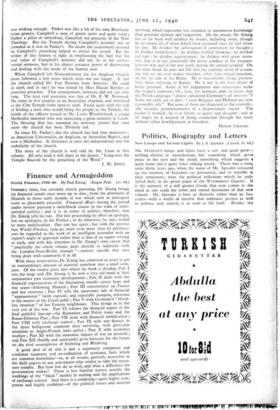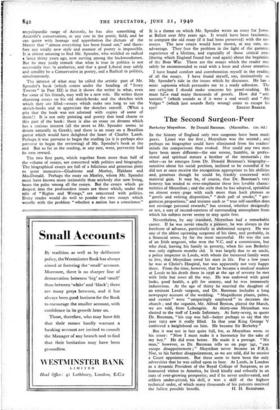Politics, Biography and Letters
New Lamps and Ancient Lights. By J. A. Spender. (Cassell. 85. 6d.)
MR. SPENDER'S lamps and lights have a soft and quiet glow— nothing electric or incandescent, but something which gives peace to the eyes and the mind; something which suggests a quiet room and a quiet voice talking wisely. There was a time, some thirty years ago, when the name of Mr. Spender conjured up the memory of Isocrates—so persuasive, and so sensible in their sentiments, were the political reflections which he pub- lished daily in the green pages of the Westminster Gazette. It is the memory of a still greater Greek that now comes to the mind as one reads the sober and varied discourses of this new volume. Mr. Spender is here an Aristotle rather than an Iso- crates—with a width of interest that embraces poctics as well as politics, and, indeed, is as wide as life itself. Besides the encyclopaedic range of Aristotle, he has also something of Aristotle's conservatism, at any rate in the poetic field; and he can quote with homage and approbation the dictum of the Master that " almost everything has been found out and there- fore any totally new style and manner of poetry is impossible. It is almost amusing to find Mr. Spender, who wielded so radical a lance thirty years ago, now serving among the backwoodsmen. But he may justly remark that what is true in politics is not necessarily true in aesthetics, and that a good Liberal may safely and sensibly be a Conservative in poetry, and a Radical in politics, simultaneously.
The interest of what may be called the artistic part of Mr. Spender's book (which comes under the heading of " Ivory Towers " in Part III) is that it shows the writer in what, even for some of his friends, may well be a new role. He writes three charming essays on his old sketch-books and the sketches with which they are filled —essays which make one long to see the sketch-books and to appreciate the sketches oneself. (What a pity that the book was not adorned with copies of some of them!) It is not only painting and poetry that lend charm to this part of the book: there is also an essay on dreams which has a curious interest (all the more as Mr. Spender seems to dream naturally in Greek); and there is an essay on a Brazilian parrot which would have delighted the heart of Charles Lamb. Perhaps it was perverse to begin the reading (as it is perhaps also perverse to begin the reviewing) of Mr. Spender's book at the end But so far as the reading, at any rate, went, perversity had its own reward.
The two first parts, which together form more than half of the volume of essays, are concerned with politics and biography. The biographical essays are full of a felicitous and generous piety to great memories—Gladstone and Morley, Haldane and MacDonald. Perhaps the essay on Morley, whom Mr. Spender must have known more intimately than anybody else now living, bears the palm among all the essays. But the essays which go deepest into the profoundest issues are those which, under the title of "Rights and Wrongs," are concerned with politics. Every reader would do well to ponder the two essays which wrestle with the problem " whether a nation has a conscience."
It is a theme on which Mr. Spender wrote an essay for Jowet at Balliol over fifty years ago. It would have been fascinatin to compare the old essay (if it had been preserved) with the nev essays. The new essays would have shown, at any rate, on: advantage. They face the problem in the light of the garnere,: experience of a lifetime, and especially of those critical year (during which England found her soul again) about the beginninz of the Boer War. These are the essays which the reader ma% safely be recommended to read with a keen and closer attention.
I have found comfort and corroboration myself in the reading of all the essays. I have found myself, too, instinctively Mr. Spender's side in the issues which he discusses. He has a mitis sapientia which persuades me to a ready adhesion. The one criticism I should make concerns his proof-reading. He must hLe read many thousands of proofs. How did " arti- socratic " (which sounds as if it were a real word) and " Abt Volger " (which just sounds flatly wrong) come to escape his































 Previous page
Previous page